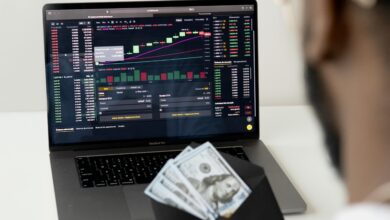Mastering the Market Mindset: The Impact of Emotions and Biases on Trading Decisions

In the high-stakes world of trading, where fortunes can be made or lost in the blink of an eye, the influence of emotions is often underestimated. While technical analysis and market trends dominate the conversation, the psychological factors that drive decision-making are equally crucial. Fear and greed are powerful forces that can cloud judgment and lead to impulsive actions, often resulting in costly mistakes. Understanding the emotional landscape of trading is essential for anyone looking to navigate the complexities of the financial markets successfully.
In this article, we will delve into the intricate relationship between psychology and trading, exploring how emotions shape our decisions. We will begin by examining the dual forces of fear and greed, which can propel traders toward both opportunity and disaster. Next, we will uncover the cognitive biases that frequently derail even the most seasoned investors, highlighting the psychological pitfalls that can skew perception and judgment. Finally, we will provide practical strategies for developing emotional resilience, equipping traders with the mindset needed to thrive amidst market volatility. Join us as we uncover the psychological underpinnings of trading and discover how mastering our emotions can lead to more informed and successful trading decisions.
- understanding-the-emotional-landscape:-the-role-of-fear-and-greed-in-trading-decisions–“>
1. Understanding the Emotional Landscape: The Role of Fear and Greed in Trading Decisions
In the realm of trading, emotions play a pivotal role in shaping decisions, often leading to outcomes that deviate from rational analysis. Among the myriad of feelings traders experience, fear and greed stand out as the most influential forces. Understanding these emotions is crucial for any trader, as they can significantly impact judgment and, consequently, performance.
Fear in trading manifests in various forms, including the fear of losing money, fear of missing out (FOMO), and the anxiety that accompanies uncertainty. This fear can lead to overly cautious behaviors, such as exiting positions prematurely or avoiding potentially lucrative opportunities. When faced with market volatility, fear can cloud judgment, prompting traders to make impulsive decisions—like selling at a loss—rather than sticking to a well-thought-out strategy. This emotional response often stems from a desire to preserve capital and avoid the pain associated with losses, which can create a cycle of regret and hesitation.
Conversely, greed can propel traders into high-risk decisions, driven by the allure of profit. The excitement of a winning position can lead to overconfidence, where traders might disregard their risk management rules or fail to recognize when market conditions are shifting unfavorably. Greed can also encourage traders to hold onto positions for too long, hoping for larger gains rather than realizing profits at a safer juncture. This can result in missed opportunities or even significant losses, as the market can be unpredictable and unforgiving.
Navigating the emotional landscape of trading requires self-awareness and discipline. Traders must recognize when fear or greed is influencing their decisions and develop strategies to mitigate these impulses. Techniques such as setting predefined entry and exit points, employing stop-loss orders, and maintaining a trading journal can help traders stay grounded in their plans, allowing them to make decisions based on logic rather than emotional reactions.
Ultimately, acknowledging and understanding the psychological factors at play in trading can empower traders to cultivate a more balanced approach. By fostering emotional intelligence and resilience, traders can improve their decision-making processes, leading to more favorable outcomes in the unpredictable world of the financial markets.
In the world of trading, where financial stakes are often high and markets can be unpredictable, the interplay between psychology and decision-making becomes a crucial focal point. Emotions such as fear, greed, excitement, and anxiety significantly influence traders' behavior, often leading to decisions that deviate from rational analysis. Understanding these psychological factors is essential for anyone engaging in trading, as they can dictate not only individual performance but also broader market trends.
Fear is perhaps the most potent emotion in trading. It can manifest as a fear of loss, prompting traders to make hasty decisions, such as selling assets at inopportune times to avoid further losses. This reaction is reinforced by the psychological phenomenon known as loss aversion, where the pain of losing money is felt more acutely than the pleasure of gaining the same amount. Consequently, fear can trap traders in a cycle of reactive behavior, preventing them from adhering to their strategies or sticking to their long-term goals.
On the other hand, greed can lead to overconfidence and excessive risk-taking. When traders experience a string of successes, they may underestimate potential risks, believing they can continue to outsmart the market. This can result in poor judgment, such as holding onto losing positions for too long in the hope of a turnaround or over-leveraging their trades in pursuit of higher returns. The euphoric state that accompanies greed often clouds rational thinking, which is essential for sound decision-making.
Another emotional factor is the impact of social dynamics and herd behavior. Traders are not isolated individuals; they are influenced by the sentiments and actions of others in the market. This can lead to groupthink, where traders collectively buy or sell based on prevailing market sentiments rather than their analyses. The fear of missing out (FOMO) can drive individuals to make impulsive trades, chasing trends without fully understanding the underlying fundamentals. Conversely, when market sentiment turns negative, traders may panic and sell en masse, exacerbating downturns.
To navigate these emotional pitfalls, traders can benefit from developing strong self-awareness and employing strategies such as setting clear trading plans, establishing risk management protocols, and maintaining a disciplined approach. Techniques such as mindfulness and cognitive behavioral strategies can also help traders recognize and regulate their emotional responses, promoting a more balanced decision-making process.
Ultimately, acknowledging the psychological aspects of trading is vital for any trader seeking to enhance their performance. By understanding how emotions influence their choices, traders can cultivate greater resilience and adaptability in the face of market volatility, leading to more informed and rational decision-making in their trading endeavors.





